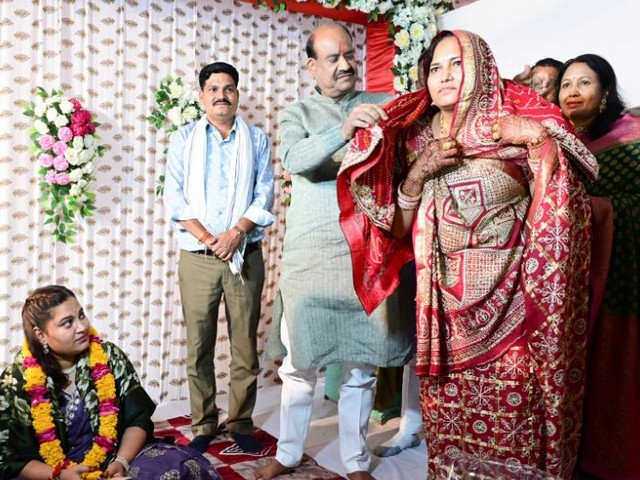"Today, North-East India is becoming a place of opportunity": Vice President Dhankhar
Oct 27, 2024

Guwahati (Assam) [India], October 27 : Vice President Jagdeep Dhankhar on Sunday said that the North East is now centre stage in our national story, emphasizing the growing prominence of the North East region in India's national narrative.
He remarked, "We are seeing a phase of Purvodaya that was never imagined, even by the people of this land."
Addressing the gathering at the 21st International Conclave of Krishnaguru International Spiritual Youth Society at the College of Veterinary Science, Guwahati, Dhankhar emphasized that the transformation of the Northeast is a testament to the spirit of inclusion driving India's progress.
"For decades, this region faced challenges relating to development and connectivity, but today it has become a true priority," he observed, reflecting on how the region's development is advancing rapidly each day.
The Vice-President said, "The three principles that will help you as a part of the transformation mechanism in our country are: in any situation, do not distance yourself from spirituality."
"Krishnaguruji has taught the path of spirituality, and straying from this path would be a mistake. Along with this path, keep in mind nationalism, modernity, and technological development. When these three combine, as has been mentioned here, and as was recorded many years ago -- the status of being a 'Vishwaguru,' the greatest economic power in the world -- no one will be able to stop it; it rests on your shoulders," he said.
The vice president praised the impact of Krishnaguruji's teachings, saying "Krishnaguru ji embodies the essence of divine grace, illuminating the hearts of his devotees with his teachings of love, service, and humanity."
He further emphasized the teachings of Krishnaguruji, who encouraged everyone to "think beyond yourself, think for the community, think for the nation." He highlighted that India is a unique country, "whose geography is dotted by centres of spirituality," reinforcing the nation's legacy of compassion, unity, and dedication to the welfare of all.
The Vice President further highlighted the inherent qualities of spirituality, urging the promotion of values that lead to harmony and justice.
He remarked, "Remember, my friends, that spirituality has some inbuilt qualities: love, compassion, patience, tolerance, forgiveness, and a sense of responsibility. As we promote these values, we sow the seeds for a peaceful and just world."
The Vice President reflected on India's history of resilience and selfless service, particularly in times of crisis.
He remarked, "Throughout our history, we have been given many opportunities. Our great leaders and spiritual figures have always supported us in times of crisis, providing a culture where, whether it be the COVID-19 pandemic, an earthquake, or any other calamity, our temples and spiritual centres have come forward to provide relief to the people."
Reflecting on the significance of India's ancient texts, he continued, "What do these scriptures -- the Ramayana, Mahabharata, Bhagavad Gita, Upanishads, and Vedas -- remind us? That action should be guided by a higher purpose, benefiting not only ourselves but also others and our communities. This message resonates deeply today."
The Vice President also elaborated on the evolution of India's foreign policy concerning the East.
"The vision of Look East, which originated in the mid-90s, was transformed by Prime Minister Modi into a more impactful dimension with Look East-Act East. This means that Bharat began engaging more deeply with South-East Asian countries," he said.
He highlighted that through the Look East-Act East policy, India has significantly strengthened its engagement with Southeast Asian nations, enhancing the strategic and economic importance of North-East India.
"Because of this Look East-Act East policy, where we are reaching out to the countries of South-East Asia, the North-East has earned a place of prominence. Today, North-East India is becoming a place of opportunity," the Vice President added, underscoring the policy's transformative role in shaping the North-East as a vibrant and thriving region.
Dhankhar expressed pride in the increasing recognition of the Northeast's distinct identity and cultural heritage.
He remarked, "There is growing acknowledgement of the unique identity and culture of the Northeast. Recently, we witnessed a proud moment when a long-standing need was fulfilled with the recognition of Assamese, alongside Bengali, Marathi, Pali, and Prakrit, as one of India's classical languages."
The Vice-President noted that this is a significant milestone for Assam saying, "This recognition will further enable Assam to share its rich cultural heritage and vernacular tapestry, extending its influence and cultural wealth throughout the country."
He added, "This region's unalloyed beauty creates an atmosphere of peace conducive to introspection and meditation, allowing a deeper exploration of spirituality and a greater appreciation for the interconnectedness of life."
Dhankhar also shared key statistics that reflect the scale of transformation: "In the last 10 years, the central government has invested 3.37 lakh crore rupees in this area. These are not just numbers; they signify a tangible footprint of roads, railways, and airports, as well as improved connectivity."
Lakshman Prasad Acharya, Assam Governor, Dr Himanta Biswa Sarma, Chief Minister of Assam, Sarbananda Sonowal, Union Minister of Ports, Shipping & Waterways, Govt. of India, Pramod Boro, CEM, BTR, Bhaktimatri Kuntala Patowari Gowsami, Kamala Gogoi, President, Krishnaguru International Spiritual Youth Society and other dignitaries were also present on the occasion.


















